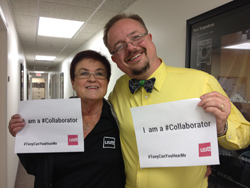News From David Grindle, USITT Executive Director
On Collaboration
We often speak of collaboration in entertainment design and technology. It is the focus of classes in universities, books, and many bar room discussions. But there is a point in collaboration that I think gets overlooked: dialogue.

#Collaborators Carolyn Satter & David Grindle
In a recent meeting for another organization, a workshop revolved around dialogue versus debate. It put me to thinking how many times I had witnessed debates rather than dialogue in our attempts to be collaborative.
I pondered that because I was intrigued by the definitions used in this workshop. I thought debate was unfairly vilified. It was characterized as being focused on swaying people to one side, trying to destroy the views of the opponent, and seeking only one benefit.
The handouts for this event seemed to try to portray debate and dialogue as being mutually exclusive. While we are all far too familiar with debates that allow zero dialogue, there is room for dialogue in debate.
What I did appreciate about the handouts for this workshop was the characterization of dialogue. It was presented as listening to the views of others to inform your own, as an exchange of information to better inform yourself about viewpoints that may not align with yours, and as an open ended event. True dialogue is all of those things.
In our efforts to work with one another, we, as artists, must maintain dialogue at all times. One of my favorite moments from a production meeting came during a “debate” over how to make something happen. Several people were offering their point on how it should be done only to have others shoot each reason down. Finally, the wise technical director spoke when the debate paused, “What are you trying to achieve artistically?” That question had yet to be asked. And yet, that question prompted dialogue, not debate.
What are you trying to achieve artistically? Is that not the open door to collaboration? One professional can ask that of another and know that, ultimately, we are working towards a common goal. Too often in discussions we put ideas forward and they seem out of context because others don’t see what the end artistic result is to be. Conversely, we also put them forward when we don’t necessarily have the skill set to solve the problem but don’t trust others can achieve the result we seek.
Dialogue is a scary thing. It implies listening to others’ opinions and ideas. Sometimes we incorporate those ideas and values into our own. Other times, through dialogue, we see a different perspective or learn a history that we didn’t know or account for. Dialogue requires us to be willing to absorb information from others rather than impose our point of view upon them. It doesn’t mean agreeing, but it does mean acknowledging that the other viewpoint has validity.
I have several friends with whom I hold differing opinions (sometimes polarizing differences). However, through dialogue we can learn where our various viewpoints come from and acknowledge that they are understandable although not always agreeable. We can learn from each other and each other’s perspective. It doesn’t necessarily change our own completely but allows us to acknowledge others are there.
Collaboration creates amazing pieces of art. But, with any collaboration, there are things we wish we had done differently. Few, if any, are the artists who look at something and say, “Yep, wouldn’t change a thing.” Sometimes the things we want to change come from the ideas of others; sometimes it is because we didn’t listen to other perspectives.
Ultimately, that is what makes dialogue and collaboration so great. In dialogue and collaboration we have an open ended goal. Although we may not do that production again, the lessons learned from it will be carried on to the next project and the next team.
It seems in today’s world, people want more fiery debate and less focused and concentrated dialogue. In our world, we want more collaboration, and that comes from dialogue. Perhaps our embrace of that, whether new or rekindled, can rekindle a desire for it in other parts of our lives as well.

